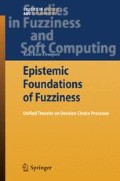Abstract
In the previous chapters, we dealt with the nature and structure of fuzzy decision-choice rationality in two spaces of non-stochastic and stochastic uncertainties. The fuzzy-stochastic uncertainties are complex with substantial epistemic difficulties that present challenges to every theoretical construct about decision-choice behavior under their conditions. The nature of these epistemic complexities gives rise to contradictions and paradoxes in our traditional thinking system as well as presents computational difficulties to decision choice agents. In this chapter, we shall examine some ideas about some contradictions and paradoxes that have been generated in classical paradigm and possible reasons. Paradoxes and contradictions in reasoning and our perceptive knowledge are the results of the designed toolbox of knowledge construction that includes acceptance and rejection principles of truth and falsity. The contents of the toolbox are the products of the accepted organic paradigm and sub-paradigms in any given social system in the knowledge construction and reduction processes. The developments of the contents and their acceptance are themselves constrained by the social ideology and its institutional subideologies that form protective belt of the decision-choice rationality in all fields of ideas and human actions.
Contradictions and paradoxes that are encountered in thought and social knowledge structure are paradigm-specific. Such contradictions and paradoxes may acquire resolutions in a different organic paradigm and subparadigms that generate alternative concepts of optimal rationality in knowledge production and decision-choice actions. For the development of the new paradigm to acquire some analytical power its fundamental assumptions must be different from other paradigms. Furthermore, to be superior, it must provide logical channels that allow solutions to both unsolved and solved problems in other paradigms. We have presented the epistemic structure of fuzzy paradigm as a shift from the classical paradigm. Let us examine contradictions in classical paradigm in relations to fuzzy decision-choice rationality.
Access this chapter
Tax calculation will be finalised at checkout
Purchases are for personal use only
Preview
Unable to display preview. Download preview PDF.
Rights and permissions
Copyright information
© 2009 Springer-Verlag Berlin Heidelberg
About this chapter
Cite this chapter
Dompere, K.K. (2009). Decision, Choice and Rationality. In: Epistemic Foundations of Fuzziness. Studies in Fuzziness and Soft Computing, vol 236. Springer, Berlin, Heidelberg. https://doi.org/10.1007/978-3-540-88085-1_6
Download citation
DOI: https://doi.org/10.1007/978-3-540-88085-1_6
Publisher Name: Springer, Berlin, Heidelberg
Print ISBN: 978-3-540-88084-4
Online ISBN: 978-3-540-88085-1
eBook Packages: EngineeringEngineering (R0)

